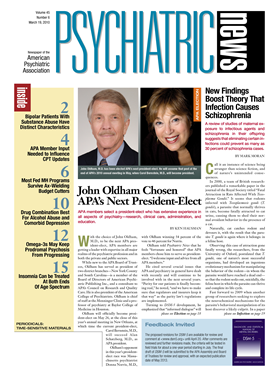APA needs your help.
The federal government is initiating a review of billing codes used for all medical practices and procedures—including those used by psychiatrists and mental health professionals—that should result in changing the amount clinicians will be reimbursed under Medicare, and by extension by some private insurance companies.
Specialty societies like APA play a large role in this reevaluation by having members participate in a survey of the “relative work values”—the component of the Medicare payment formula that places a value on procedures performed by clinicians, based on the intensity of work involved in those procedures compared with other medical procedures.
(Information on how you can participate in the process appears at the end of this article. The start date is tentatively scheduled for May.)
The end result of the review of reimbursement codes may be, for any one code, profoundly positive or negative—yielding an increase or a decrease in payment—or it may result in little or no change. But the changes are imminent—they will go into effect in 2011—and the importance of the survey process, and of involvement by APA members, cannot be underestimated.
Psychiatrist Naakesh Dewan, M.D., an APA advisor to the AMA's Relative Value Scale Update Committee (RUC), which coordinates the review process, told Psychiatric News that codes for psychiatry have not been reviewed since 1998, and profound changes have occurred since then in the way clinicians practice.
He said few other efforts undertaken by organized medicine have as far reaching an impact on doctors—regardless of whether they are AMA members (or APA members) and regardless of what kind of psychiatry they practice.
“How [the work of our specialty] is valued will dictate how Medicare and insurance companies value us,” Dewan said.
Medicare payment is based on the Resource-Based Relative Value Scale (RBRVS), a formula devised in the 1980s by health economist William Hsiao, Ph.D., to provide an approximation of a rational payment scheme, based on measures of the relative physician resources involved in providing a service, including a “physician work” component.
Medicare and the RUC define the physician work component as reflecting these factors:
•.
The time it takes to perform the service.
•.
Technical skill and physical effort required.
•.
Mental effort and judgment required.
•.
The amount of stress associated with the physician's concern about iatrogenic risk.
It is up to specialty societies like APA to survey a representative sample of physicians in the specialty for their evaluation of the work involved in a service or procedure relative to a set of other “reference” services or procedures.
That's where APA members come in. APA needs its members who are knowledgeable about codes and coding to participate in the upcoming survey to ensure that the ultimate reimbursement for what psychiatrists do for their patients accurately reflects their time, effort, and expertise.
While the physician payment formula for Medicare is daunting, the involvement of individual clinicians in the survey process need not be so.
Psychiatric News will be publicizing this effort further, and APA's Office of Healthcare Systems and Financing is prepared to help educate members about the review process. Moreover, the AMA's RUC has a detailed and easily accessible educational PowerPoint program posted at APA's Web site.
And because the survey assesses work values associated with any procedure relative to other procedures—hence their “relative” value—other nonpsychiatrist clinicians will be weighing in on the work psychiatrists do.
“The entire process is designed to value any procedure a clinician does relative to the rest of medicine,” Dewan told Psychiatric News. “Will we be seen primarily as therapists who do a tiny bit of medicine or as physicians who also provide a valuable skill in psychotherapy? Historically we have been seen as professionals who do psychotherapy with a bit of medical thinking. But many psychiatrists see themselves as physicians first.”
